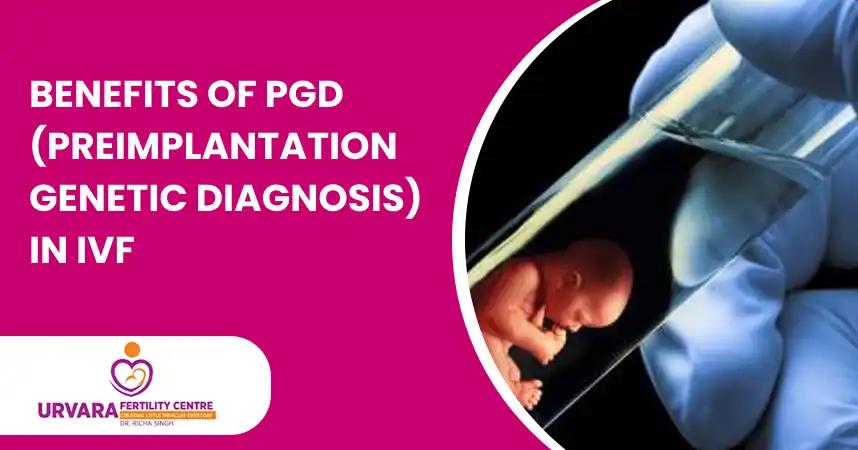
Benefits of PGD (Preimplantation Genetic Diagnosis) in IVF
When couples embark on their journey to parenthood through In-Vitro Fertilization (IVF), one of their biggest concerns is ensuring the health of their future baby. Preimplantation Genetic Diagnosis (PGD) is a revolutionary advancement in assisted reproductive technologies that addresses this concern.
By identifying genetic abnormalities in embryos before implantation, PGD helps couples make informed decisions, increasing the chances of a successful pregnancy and reducing the risk of inherited conditions.
This article is a comprehensive guide to understanding the benefits of PGD in IVF, answering all your questions in simple terms to make this topic easy to grasp. Whether you are considering IVF or just curious about genetic screening, read on to learn why PGD could be a game-changer for many families.
What is PGD (Preimplantation Genetic Diagnosis)?
PGD is a specialized technique used alongside IVF to test embryos for genetic disorders before they are implanted into the uterus. This process involves:
-
Egg and Sperm Retrieval: Eggs are fertilized with sperm in a lab to create embryos.
-
Embryo Biopsy: A few cells are taken from each embryo for genetic analysis.
-
Genetic Testing: These cells are screened for chromosomal abnormalities or specific genetic disorders.
-
Selection: Only healthy embryos without genetic issues are selected for implantation.
Benefits of PGD in IVF
1. Reduces the Risk of Genetic Disorders
PGD allows doctors to screen for a wide range of genetic conditions, including cystic fibrosis, sickle cell anemia, and Down syndrome. This significantly reduces the risk of passing inherited conditions to your child.
2. Increases IVF Success Rates
By selecting genetically healthy embryos, PGD enhances the chances of successful implantation and pregnancy. It reduces the likelihood of miscarriage caused by chromosomal abnormalities.
3. Supports Family Balancing
PGD can also help parents who wish to balance their family by selecting embryos of a specific sex. However, this is subject to ethical and legal considerations in different regions.
4. Prevents Recurrent Pregnancy Loss
Couples who have experienced multiple miscarriages may benefit from PGD. It identifies embryos with the best potential to develop into a healthy pregnancy.
5. Reduces Emotional and Financial Strain
IVF can be an emotional and financial investment. PGD optimizes the process by increasing the probability of success, thereby reducing the need for multiple IVF cycles.
6. Offers Reassurance to Parents
Knowing that your child is less likely to inherit a genetic disorder provides immense peace of mind for many couples.
How PGD Works with IVF
-
Ovarian Stimulation: Hormones are administered to stimulate egg production.
-
Egg Retrieval: Eggs are collected from the ovaries.
-
Fertilization: Eggs are fertilized in the lab.
-
Embryo Biopsy: On the fifth or sixth day of development, a few cells are removed for genetic testing.
-
Genetic Analysis: Tests are conducted to detect abnormalities.
-
Embryo Transfer: Only healthy embryos are implanted into the uterus.
To learn more about the importance of uterine health in IVF, visit Importance of Endometrial Thickness.
Preparing for PGD
Before undergoing PGD, it is essential to:
-
Consult a Genetic Counsellor: Understand the genetic risks and benefits.
-
Conduct Carrier Screening: Identify potential genetic conditions carried by the parents.
-
Evaluate IVF Readiness: Ensure both partners are physically and emotionally prepared for the process.
Challenges and Considerations
While PGD offers numerous benefits, it is not without challenges:
-
Cost: PGD adds to the cost of IVF, making it less accessible for some couples.
-
Ethical Concerns: The selection of embryos for non-medical reasons, such as sex, is a contentious issue.
-
Accuracy: While highly reliable, PGD is not 100% foolproof and cannot detect all genetic conditions.
FAQs About PGD in IVF
Q1. Who should consider PGD?
Couples with a history of genetic disorders, recurrent miscarriages, or advanced maternal age may benefit from PGD.
Q2. Is PGD painful?
PGD itself is not painful as it involves testing embryos outside the body. However, the IVF process may involve some discomfort.
Q3. Can PGD guarantee a healthy baby?
While PGD significantly reduces the risk of genetic disorders, it cannot guarantee a completely healthy baby due to other factors like environmental influences.
Q4. How much does PGD cost?
Costs vary by location and clinic but typically range from $5,000 to $10,000 in addition to IVF expenses.
Q5. Does PGD affect embryo quality?
When performed by skilled professionals, PGD does not harm embryo quality.
Conclusion
PGD in IVF is a powerful tool that offers hope to couples at risk of passing on genetic disorders. By enhancing the chances of a healthy pregnancy, it minimizes emotional and financial strain, making the journey to parenthood more reassuring. However, couples must weigh the benefits against the costs and ethical considerations. Consulting with a fertility specialist and genetic counselor is crucial to making an informed decision.
For those undergoing IVF, optimizing uterine health is also essential. Discover how to Improve Endometrial Thickness for IVF Success to enhance your chances.
Content Created By:

Cyberbizz Technologies
Team - Content Curator

